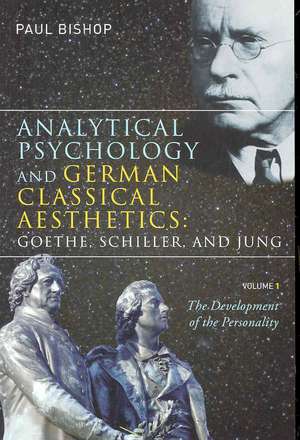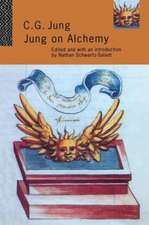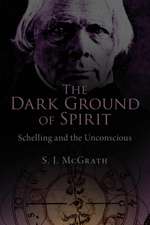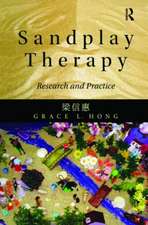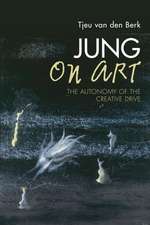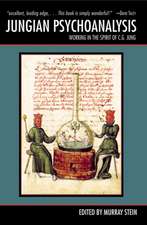Analytical Psychology and German Classical Aesthetics: Goethe, Schiller, and Jung, Volume 1: The Development of the Personality
Autor Paul Bishopen Limba Engleză Paperback – 12 iul 2007
Analytical Psychology and German Classical Aesthetics argues that analytical psychology appropriates many of its central notions from German classical aesthetics, and that, when seen in its intellectual historical context, the true originality of analytical psychology lies in its reformulation of key tenets of German classicism. Although the importance for Jung of German thought in general, and of Goethe and Schiller in particular, has frequently been acknowledged, until now it has never been examined in any detailed or systematic way. Through an analysis of Jung’s reception of Goethe and Schiller, Analytical Psychology and German Classical Aesthetics demonstrates the intellectual continuity within analytical psychology and the filiation of ideas from German classical aesthetics to Jungian thought. In this way it suggests that a rereading of analytical psychology in the light of German classical aesthetics offers an intellectually coherent understanding of analytical psychology.
By uncovering the philosophical sources of analytical psychology, this first volume returns Jung’s thought to its core intellectual tradition, in the light of which analytical psychology gains new critical impact and fresh relevance for modern thought. Written in a scholarly yet accessible style, this book will interest students and scholars alike in the areas of analytical psychology, comparative literature, and the history of ideas.
| Toate formatele și edițiile | Preț | Express |
|---|---|---|
| Paperback (1) | 399.83 lei 6-8 săpt. | |
| Taylor & Francis – 12 iul 2007 | 399.83 lei 6-8 săpt. | |
| Hardback (1) | 947.36 lei 6-8 săpt. | |
| Taylor & Francis – 12 iul 2007 | 947.36 lei 6-8 săpt. |
Preț: 399.83 lei
Nou
Puncte Express: 600
Preț estimativ în valută:
76.51€ • 80.09$ • 63.30£
76.51€ • 80.09$ • 63.30£
Carte tipărită la comandă
Livrare economică 07-21 aprilie
Preluare comenzi: 021 569.72.76
Specificații
ISBN-13: 9781583918098
ISBN-10: 1583918094
Pagini: 248
Dimensiuni: 156 x 234 x 18 mm
Greutate: 0.39 kg
Ediția:1
Editura: Taylor & Francis
Colecția Routledge
Locul publicării:Oxford, United Kingdom
ISBN-10: 1583918094
Pagini: 248
Dimensiuni: 156 x 234 x 18 mm
Greutate: 0.39 kg
Ediția:1
Editura: Taylor & Francis
Colecția Routledge
Locul publicării:Oxford, United Kingdom
Public țintă
Professional Practice & DevelopmentCuprins
Bishop, Introduction. Biographical and intellectual affinities between Goethe and Jung. Jung’s early reception of Goethe and Faust, 1880-1916. Schiller and the problem of typology. Schiller and the problem of beauty. Conclusion: The development of the personality.
Notă biografică
Paul Bishop is Professor of German at the University of Glasgow. His previous publications include Jung’s 'Answer to Job': A Commentary (Routledge, 2002) and the edited collection Jung in Contexts: A Reader (Routledge, 1999).
Recenzii
"Analytical Psychology and German Classical Aesthetics is an endlessly fascinating account of a complex and important influence. It is written in tightly-argued but always accessible jargon-free prose and it is published simultaneously in hardback and a handsomely-designed paper cover. It can be strongly recommended not only to all Jungian analysts and scholars working within Jungian Studies, but to everyone interested in the history of ideas." - Terence Dawson, International Journal of Jungian Studies, Vol. 1, No. 2, September 2009
"It is a great addition to our literature, for it has the capacity to help those of us who are already steeped in Jungian thought change the way we hold familiar things and to make it possible for many more that have not been able to accept Jung's premises, to see them in a different cultural light." - John Beebe, Journal of Analytical Psychology, Vol 54, 2009
"It is a great addition to our literature, for it has the capacity to help those of us who are already steeped in Jungian thought change the way we hold familiar things and to make it possible for many more that have not been able to accept Jung's premises, to see them in a different cultural light." - John Beebe, Journal of Analytical Psychology, Vol 54, 2009
Descriere
This book argues that analytical psychology takes many of its central notions from German classical aesthetics, and when seen in its intellectual historical context its true originality lies in its reformulation of key tenets of German classicism.
